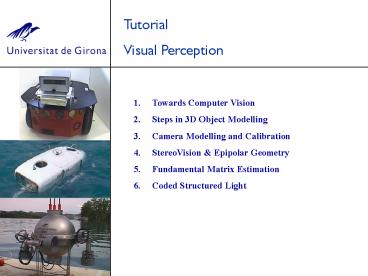Presentaci - PowerPoint PPT Presentation
Title:
Presentaci
Description:
Sclera: Outer cover composed of a fibrous coat that surrounds the choroid. Choroid: a layer of blood ... Greatest presence at the Fovea region (sharpest vision) ... – PowerPoint PPT presentation
Number of Views:28
Avg rating:3.0/5.0
Title: Presentaci
1
Tutorial Visual Perception
- Towards Computer Vision
- Steps in 3D Object Modelling
- Camera Modelling and Calibration
- StereoVision Epipolar Geometry
- Fundamental Matrix Estimation
- Coded Structured Light
2
- Human Vision
- Identify objects
- Locate its 3D position.
Image acquisition
Image interpretation
3
The Human Eye ?
- Eye shape
- Cornea Transparent surface.
- Sclera Outer cover composed of a fibrous coat
that surrounds the choroid. - Choroid a layer of blood capillaries.
- Retina layer inside the choroid composed of two
types of receptors (rods and cones) and a netword
of nerves. - Optic nerve Retinal nerves leave the eye to the
brain trough the optic nerve bundle.
- Image enhancement
- Cornea Transparent surface.
- Lens Focuses the light to the retina surface to
perform proper focus of near and distant objects. - Iris Acts as a diaphragm to control the amount
of light entering the eye.
4
How an eye is working ?
- Image acquisition
- Retina Composed of
- 100 M. Rods Long slender receptors.
- Sensitive at low levels of light.
- 6.5 M. Cones. Shorter and thicker receptors.
- Sensitive at high levels of light.
- Greatest presence at the Fovea region (sharpest
vision). - Three types of cones with different wavelength
absorption with peaks in the blue, green and red
light spectrum - Light stimulus activate a rod or cone producing
a nerve impulse which is transmitted through the
optic nerve.
More information at http//www.vision.ca/eye/lobb
y.html
5
Computer Vision Object Recognition. Object
Localisation. Advantage Automatisation. Constrai
nt Difficult to transmit the human intelligence
and skills to a computer. Applications Shape
Inspection for quality control Rapid
Prototyping Computer assisted surgery Film making
effects Object picking Robot Navigation
Image acquisition
?
?
Image interpretation
6
3D Information
System selection
Modelling
Calibration
Correspondence
Get 3D Cloud
Data Fusion
7
System Selection
- Combination of computational and optical
techniques aimed at estimating or making explicit
geometric (3D shape) properties of objects or
scenes from their digital images. - stereovision
- pattern projection
- laser scanning
- shape from X (motion, texture, shading, focus,
zoom) - Computation for all or some pixels of the
distance between a known reference frame and the
scene point that is imaged in those pixels. The
output is a range image (depth map) or a cloud of
points (xi, yi, zi), i1..N. - The fusion of several range images or point
clouds corresponding to partially different views
of an object may yield its full 3D digitization.
8
Main processes in 3D digitization
solid(triangles)
graphicsurface
N 3D point clouds
Range sensing
Geometric fusion
Objectmodeling
object
solid (splines)
System Selection
best nextview
Sensorplanning
- Stereovision
- Pattern projection
- Laser scanning
- Shape from X
- (motion, texture, shading, focus, zoom)
Texturemapping
coloured solid
9
Geometric fusion
24 aligned 3D scans ready for merging
set of six 3D scans acquired from different
viewpoints and their alignment (center)
24 meshes merged into a surface triangulation.
10
Applications
Dense reconstruction Visual
inspection Object localization Camera
localization































